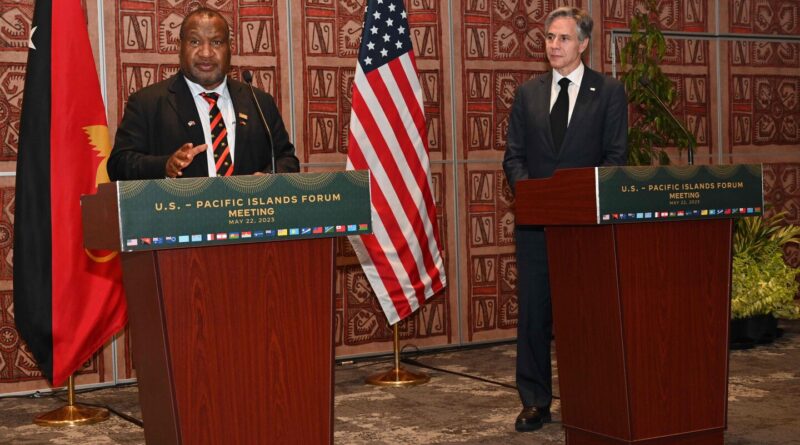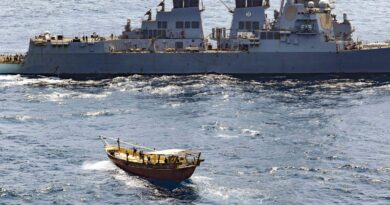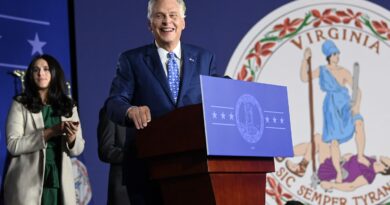U.S. and Papua New Guinea sign security agreement despite setbacks
“We’re working together as regional security partners,” Blinken said at a signing ceremony in the capital, Port Moresby. “We’re boosting our shared vision of a free and open Indo-Pacific.”
The two countries also signed a maritime surveillance agreement that will enable the U.S. Coast Guard to help patrol Papua New Guinea’s vast maritime territory, and the United States agreed to provide the developing nation of 10 million people with $45 million in equipment and assistance, the State Department said.
Marape called the security deal a “two-way highway” between the two nations, while Blinken said it would make it easier for their militaries to train together and improve the Pacific nation’s ability to respond to humanitarian disasters.
The security pact was supposed to be the defining moment from a historic trip for Biden, who would have been the first sitting U.S. president to visit a Pacific island nation. The trip — to a country where two of Biden’s uncles fought during World War II, and where one died — was intended to be a statement of American commitment to the region at a time of increased competition with China for influence.
Biden’s decision to head home after the Group of Seven meetings in Japan — canceling the Papua New Guinea and Australian legs of his trip — so he could negotiate with Republicans over the debt ceiling was a blow for American credibility in the Pacific, analysts said.
But the president’s about-face was not the only hiccup ahead of Monday’s signing.
A purported leak of the agreement last week stirred anger in Papua New Guinea and raised questions over whether the pact was in the Pacific nation’s interests. On Monday morning, students at several universities protested, demanding more information or for the deal to be scrapped altogether. “The university is closed until the defense agreement is made known,” read one sign.
Blinken and Marape both appeared to address those concerns on Monday.
The secretary of state said the agreement was drafted by the two countries “as equal and sovereign partners,” adding that the United States would be “fully transparent” over the pact’s provisions.
“The signing in no way, shape or form encroaches into our sovereignty,” said Marape, who said the pact did not prevent his country from entering into security agreements with other nations.
The full agreement will be made public once politicians in both countries have a chance for input, the Associated Press reported.
The security agreement will likely give the United States greater access to ports and airports in a country of strategic importance, said Mihai Sora, a former Australian diplomat in the Pacific who is now a research fellow at the Lowy Institute, a Sydney think tank. Papua New Guinea was the site of intense fighting during World War II.
“The payoff for Papua New Guinea is that it gets more support for law enforcement and security, that’s both economically important and politically important for the government of PNG to be able to deliver,” he told The Washington Post last week, stressing that he had not seen the agreement. “The payoff for the United States is that it’s seen to do good in the region, but also it firms up its strategic access and it supports a democratic country in a region that is being hotly contested.”
China has increased its own security ties to Pacific island nations in recent years. Beijing’s announcement last year that it had struck a security agreement with the Solomon Islands — just east of Papua New Guinea — sparked fears that China could build a military base 1,000 miles from the shores of Australia, America’s closest ally in the region.
The Solomon Islands and China have denied any intention to build a base, but American and Australian officials remain wary of what they believe is Beijing’s intention to extend its already growing global military footprint to strategically important parts of the South Pacific.
China also attempted to strike a sweeping multilateral economic and security agreement with almost a dozen countries in the region last year, but failed.
At an evening news conference after the signing, however, Marape said “there is nothing for us to be fearful about” the security agreement, and that it “has nothing to do with China.”
Biden was supposed to meet with the leaders of many of those same countries at a Pacific Islands Forum meeting in Port Moresby on Monday. Instead, it was Blinken who told them that the U.S. president was sorry he couldn’t attend but that they were invited to meet with Biden at the White House this fall — the second event of its kind after a historic U.S.-Pacific islands summit in September.
Blinken cited a list of recent American investments in the region, from increased aid to new embassies to the appointment of the first U.S. envoy to the Pacific Islands Forum, as evidence that the United States was seeing through the promises made last fall.
He also announced he would be signing new Compacts of Free Association, or COFA, agreements with two of the United States’ closest allies in the Pacific, Palau and the Federated States of Micronesia, during his trip. Compact negotiations with the Republic of the Marshall Islands would begin “very soon,” Blinken said.
The new COFA agreements, which replace expiring ones and give the United States exclusive military access, will provide the three Pacific island nations with more than $7.1 billion over the next 20 years, Blinken said.
“America’s future is here in the Pacific,” he told the Pacific leaders.
Yet, America’s long-term role in the region remains in doubt as other nations raise their profile — and not only China.
With Biden absent, much of the attention fell on Indian Prime Minister Narendra Modi, who held his own meeting with Pacific island leaders on Monday before heading to Australia.
Marape’s warm words for Modi, which compared the two countries’ colonial histories and developing economies, also reflected the challenges facing the United States as it tries to re-engage with the region.
Calling Modi “the leader of the Global South,” Marape urged the Indian prime minister to advocate on behalf of Pacific island nations in meetings with developed nations.




